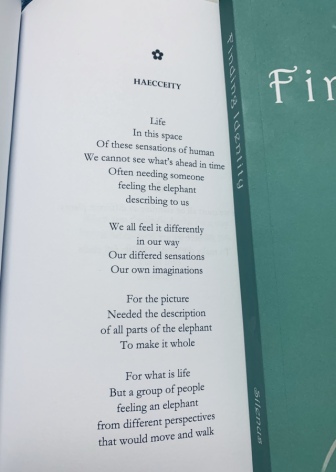This has always bugged me. It is as if we cannot see the water(faith) in which we're swimming.
Everything from the sciences to mathematics to philosophy and even to religion seem (at least on some levels) to require blind faith in logic. Granted, sometimes the logic is flawed (such as in religion), but it's still a base assumption. Everything is based on "if this, then that" causal thinking.
I admit that it's difficult to imagine operating in the world without employing logic and reason, but few folks realize that these tools are are most fundamental blind faith assumption of the universe. Simply stating "but we have nothing if we don't assume a logical and cohesive, rule-oriented world" is not proof of a "logical and cohesive, rule-oriented world."
Even pointing to our past experience as evidence for the reliability of logic is not sufficient. In fact, it's circular reasoning (i.e., "I know logic is reliable because things turn out logical when I employ logic').
Anyway -- I guess I find it surprising that few people, even when fragility of their certainties are highlighted, are willing to concede that logic is a fundamental belief.,
Why do we believe logic and reason are fundamental and reliable methods through which we can discern truth?
2020-01-23 1:29 am
回答 (17)
2020-01-24 9:43 am
✔ 最佳答案
Brilliantly said, imo, and right on the cutting edge of epistemology. Logic COULD be no more than a language - "true" only because we say it is. How would we know?
2020-01-23 4:11 am
This is a part of a poetry about what human can see or sense and how human discern things and find ways in life.

2020-01-23 1:48 am
Your belief is irrelevant. Your concern is irrelevant. Logic deals in facts, not faith. Logic is not a belief, it is an application of factual information.
2+2=4 That is not belief, that is fact, that is logical thinking.
2+2=4 That is not belief, that is fact, that is logical thinking.
2020-01-23 1:46 pm
Because the methodology of logic and reason (which is strongly linked to the scientific method) has proven to be exponentially better at advancing knowledge in most areas than than any other method. For the most part, the structure and workings of the universe that are accessible to us have yielded to logic and reason, both of which are fundamentally based on very real and repeatable experiences, not mere assumptions. Therefore logic and reason have become a fundamental part of human nature. Evolution of the species, if you will.
2020-01-23 10:39 am
You proceed from a false assumption; there is no blind faith in logic.
2020-01-23 1:35 am
Logic seems to work. Premises, through logic seem to produce conclusions that seem to be true if you assume the premises true. When you substitute a holographic world for a dualistic one, the world view changes and you come to Buddha's conclusion, "Form follows thought"
2020-01-23 1:31 am
Logic and reason only have one flaw. The Human being using them
2020-01-23 4:02 am
If one correlates or equates "faith" with Kant's Noumenal, then one is operating at a level beyond scientism or naive and circular "because it works" faith in logic and atom-based "5-sense" reasoning, which are subject to paradigm evolution and shifts, and of course open to the perspective that regards reductive materialism as simply limited to the atomic aspect of "reality."
Kant's work presented a great epistemological distinction between that which is "man, and man in nature," and "God or Noumenon."
An ontological point of development is that of "knowing self (or, in the work of philosophers such as Plotinus, Self);" for the materialist or those who "have faith" in scientism, there are three basic 5-sense vectors in "knowing self:" the physiological, the psychological or individual, and the sociological or group enculturation. Perhaps a better phrasing of "faith in matter" would be "reliance on atom-based 5-sense data." "Faith" does have its evolution from the Latin "fides," which combined the spiritual and the material: "trust, confidence (root fides), reliance, belief, credence." In the Christian era in the West, "faith" became somewhat differentiated into various degrees or extents of Spirit demonstrated in Mater, e.g. in the present the various types of panentheism: https://en.wikipedia.org/wiki/Panentheism . The "demonstration" or awareness of the Holy Spirit as connecting inner Child of Light to Soul, Spirit of Truth, is a type of specialization of epistemological awareness based upon individuated development of ontological awareness, e.g. Saul on the road to Damascus, others on the road to Emmaus, Elisha beholding the ascended Elijah, and so on.
Thus, if one is interested in expanding e.g. Schopenhauer's Noumenal awareness beyond the "blind" "life force or will" which Schopenhauer perceived, in effect moving across the phenomenal-Noumenal vibrancy, then one has four basic vectors in "knowing self (or knowing Self as God, a Platonic Eleusinian mystery school position taught by Plotinus):" depending upon one's base of ascending awareness: i.e., a mixture of Spiritual, societal, psychological, and physical body temple parameters of development.
It is obvious to the material scientist that individuals differ on various parameters, such as height, weight, personality types, expressions of cultural backgrounds, education, wealth and nationality, ability to play tennis or to learn quantum physics, etc., etc. This obvious wisdom was also expressed for the Noumenal by Saint Paul, referring to differing "starry bodies" or "treasures in heaven" of the Saints, etc.
It is easy to understand, then, that there are many avenues or paths of investigation, and much dissonance among many such, when compared. So, to answer your question, you might take a brief (a minute or several) inventory of your particular ontological emphases and epistemological conclusions or points of view. If, for example, you enjoy some measure of personal spirituality or conviction--"faith," if you will--and this is aligned with some basic religious tenets, such as are given in e.g. R. C. Sproul's books ("The Holiness of God;" "Not a Chance: God, Science, and the Revolt against Reason") and perhaps some of R. C.'s favorite teachers (A. W. Tozer, "The Pursuit of God;" J. I. Packer, "Knowing God")--then you will likely understand that loving God is the first and most secure foundation, for further development in your faith.
If you are perhaps interested also in logic and its foundations, works such as "There's Something about Godel" and "The Slightest Philosophy" are helpful.
Analytic philosophy has been, in various and changing modes, the predominant influence outside of phenomenology, etc. You might then appreciate Quine's paper "Two Dogmas of Empiricism;" Quine argued for a scientistic philosophy based upon empiricism, which correlates with Frege's developent and emphasis on predicate logic, and also with "ordinary language" analysis. Frege, Quine, and others in that "set" are perhaps more set (pun intended) against your position.
Related:
"Return to the One: Plotinus's Guide to God-Realization;"
"Philosophy of Arithmetic" by Husserl;
and, for perhaps some insight into how numbering works, "The Social Life of Numbers: A Quechua Ontology of Numbers and Philosophy of Arithmetic."
Also, "The Philosophy of Set Theory: An Historical Introduction" by Mary Tiles, and "The Path of the Higher Self."
Kant's work presented a great epistemological distinction between that which is "man, and man in nature," and "God or Noumenon."
An ontological point of development is that of "knowing self (or, in the work of philosophers such as Plotinus, Self);" for the materialist or those who "have faith" in scientism, there are three basic 5-sense vectors in "knowing self:" the physiological, the psychological or individual, and the sociological or group enculturation. Perhaps a better phrasing of "faith in matter" would be "reliance on atom-based 5-sense data." "Faith" does have its evolution from the Latin "fides," which combined the spiritual and the material: "trust, confidence (root fides), reliance, belief, credence." In the Christian era in the West, "faith" became somewhat differentiated into various degrees or extents of Spirit demonstrated in Mater, e.g. in the present the various types of panentheism: https://en.wikipedia.org/wiki/Panentheism . The "demonstration" or awareness of the Holy Spirit as connecting inner Child of Light to Soul, Spirit of Truth, is a type of specialization of epistemological awareness based upon individuated development of ontological awareness, e.g. Saul on the road to Damascus, others on the road to Emmaus, Elisha beholding the ascended Elijah, and so on.
Thus, if one is interested in expanding e.g. Schopenhauer's Noumenal awareness beyond the "blind" "life force or will" which Schopenhauer perceived, in effect moving across the phenomenal-Noumenal vibrancy, then one has four basic vectors in "knowing self (or knowing Self as God, a Platonic Eleusinian mystery school position taught by Plotinus):" depending upon one's base of ascending awareness: i.e., a mixture of Spiritual, societal, psychological, and physical body temple parameters of development.
It is obvious to the material scientist that individuals differ on various parameters, such as height, weight, personality types, expressions of cultural backgrounds, education, wealth and nationality, ability to play tennis or to learn quantum physics, etc., etc. This obvious wisdom was also expressed for the Noumenal by Saint Paul, referring to differing "starry bodies" or "treasures in heaven" of the Saints, etc.
It is easy to understand, then, that there are many avenues or paths of investigation, and much dissonance among many such, when compared. So, to answer your question, you might take a brief (a minute or several) inventory of your particular ontological emphases and epistemological conclusions or points of view. If, for example, you enjoy some measure of personal spirituality or conviction--"faith," if you will--and this is aligned with some basic religious tenets, such as are given in e.g. R. C. Sproul's books ("The Holiness of God;" "Not a Chance: God, Science, and the Revolt against Reason") and perhaps some of R. C.'s favorite teachers (A. W. Tozer, "The Pursuit of God;" J. I. Packer, "Knowing God")--then you will likely understand that loving God is the first and most secure foundation, for further development in your faith.
If you are perhaps interested also in logic and its foundations, works such as "There's Something about Godel" and "The Slightest Philosophy" are helpful.
Analytic philosophy has been, in various and changing modes, the predominant influence outside of phenomenology, etc. You might then appreciate Quine's paper "Two Dogmas of Empiricism;" Quine argued for a scientistic philosophy based upon empiricism, which correlates with Frege's developent and emphasis on predicate logic, and also with "ordinary language" analysis. Frege, Quine, and others in that "set" are perhaps more set (pun intended) against your position.
Related:
"Return to the One: Plotinus's Guide to God-Realization;"
"Philosophy of Arithmetic" by Husserl;
and, for perhaps some insight into how numbering works, "The Social Life of Numbers: A Quechua Ontology of Numbers and Philosophy of Arithmetic."
Also, "The Philosophy of Set Theory: An Historical Introduction" by Mary Tiles, and "The Path of the Higher Self."
2020-01-23 1:51 am
I wonder who you are trying to convince and whether you are seeking to rationalise your own belief system by suggesting flaws in other people's reasoning. If we start from objective facts, where is the weakness? EVERYTHING without exception that we know to be true is supported by objective evidence or robust calculations based on objective evidence. That is not to deny that we, as humans, actually rely on a lot of fuzzy logic and approximations in our day to day lives. Precision rarely matters and good approximation is often good enough. If I say I'll see you in half an hour, I have faith that you will be there and that I will be there in something like 30 minutes, and that is usually good enough. If want to cross a road before an approaching car hits me, I do not know its actual precise speed and it doesn't matter as long as my estimation is approximately right, based on my past experience of moving objects and my speed of walking. There's a lot we learn to do innately. If I claim as a fact that I am 3 metres tall, we can easily confirm this by use of objective measurements. If you tell me you had a bad dream last night, there is no objective measure and it wouldn't help if there was. It was subjectively real for you and that is good enough. If you want to claim your subjective dream was objectively real, then I suspect we will have a difference of opinion. To suggest our difference is because my reason relies on belief rather than common sense goes too far. You could easily put me right by producing some objective evidence but it is easier for you to say I am wrong.
2020-01-23 1:31 am
Well, it's only 9:30 a.m. where I live, and I think I've found my winner for dumbest question of the day.
2020-01-28 6:54 pm
in a way all faith is based on logic, were just smarter now.
2020-01-25 1:32 am
philosophy is how man's thought has developed in civilizations through the centuries. why people chose those things to believe is more a matter of social-persuasion, rather then a love of truth. so, even though works of thought exist in history as the arts, including religions, it is more then obvious that reason-&-logic did not prevail.
2020-01-23 8:11 pm
Trial and error. Using logic and reason are better for determining the actual nature of reality than using illogical or irrational methods. Logical predictions turn out to be correct more often than illogical predictions. It's not logic that proves a logical prediction to be correct; it's experimentation and test results. That's not blind faith; it's observation.
2020-01-23 7:52 pm
Who cares? -
have you got a better way of discerning it?
If so I am sure the whole world would be glad to hear it
(this is a bit stupid
Simply stating "but we have nothing if we don't assume a logical and cohesive, rule-oriented world" is not proof of a "logical and cohesive, rule-oriented world."
1) you are not "simply stating" anything - you are just condensing what you believe into a statement
2) you dont have to "prove" anything - all you have to do is know that your actions result in the thing you are trying to achieve
In centuries past people used to follow old wives tales when treating illnesses - In many cases those "old wives tales" resulted in the illness being cured . They did not require prof of how or why they worked just the knowledge that carrying them out resulted in a cure (And I do know a LOT of those "old wives tales did NOT result in a cure)
" In fact, it's circular reasoning (i.e., "I know logic is reliable because things turn out
logical when I employ logic'"
p.s - this is not "circular reasoning")
).
have you got a better way of discerning it?
If so I am sure the whole world would be glad to hear it
(this is a bit stupid
Simply stating "but we have nothing if we don't assume a logical and cohesive, rule-oriented world" is not proof of a "logical and cohesive, rule-oriented world."
1) you are not "simply stating" anything - you are just condensing what you believe into a statement
2) you dont have to "prove" anything - all you have to do is know that your actions result in the thing you are trying to achieve
In centuries past people used to follow old wives tales when treating illnesses - In many cases those "old wives tales" resulted in the illness being cured . They did not require prof of how or why they worked just the knowledge that carrying them out resulted in a cure (And I do know a LOT of those "old wives tales did NOT result in a cure)
" In fact, it's circular reasoning (i.e., "I know logic is reliable because things turn out
logical when I employ logic'"
p.s - this is not "circular reasoning")
).
2020-01-23 2:39 pm
Only within thyself can Truth of reason and logic be discerned. It is something which is revealed between me and thee and, must be kept there. :D
2020-01-23 5:44 am
The truth is we do not know logic or reason in the absolute sense. What we have are substitutes. What we call logic and reason is what we believe logic and reason to be. And as our eyes open and our minds sharpen, so will what we believe logic and reason to be.
I can only tell you what I believe. I believe truth is absolute. There is no way to violate truth. Truth is why anything is. Nothing causes anything. The only reason anything happens is truth. That it is true, it is. Everything else is merely the details of the truth.
Truth is why. But the how is the mysterious substance on which truth is applied. The How is the pre-existing mass.
Truth is the Why. But the How is Reality. Reality is how truth is realised in a living breathing world. Reality is the how. And I want to know how.
The question of reality is similar to the question of consciousness. How can truth become real and how does death become life? Why would atoms become consciousness? It’s somewhere in the cerebrum I think.
Logic and reason are what we believe them to be. And what we believe may be different. It depends on the mind and the time. The motivation too is important. I mean you may not care enough to develop your beliefs about logic and reason. It is an ongoing process. For those who are earnest in developing their beliefs, it may be impressed that the beliefs are superior. As in stronger.
Belief is what happens after experience is accumulated. Your beliefs as a child will differ from your beliefs as an adult.
Religion is a false belief though. It is not based on experience. It is a corruption of the mind. A mental malfunction. Religion is not thinking. And I mean that institution which indoctrinates children from a young age. Which hinders the freedom of their mind.
It is totally possible to form beliefs about the deep emotional side of things. And I would encourage. Find your own path and be free.
I can only tell you what I believe. I believe truth is absolute. There is no way to violate truth. Truth is why anything is. Nothing causes anything. The only reason anything happens is truth. That it is true, it is. Everything else is merely the details of the truth.
Truth is why. But the how is the mysterious substance on which truth is applied. The How is the pre-existing mass.
Truth is the Why. But the How is Reality. Reality is how truth is realised in a living breathing world. Reality is the how. And I want to know how.
The question of reality is similar to the question of consciousness. How can truth become real and how does death become life? Why would atoms become consciousness? It’s somewhere in the cerebrum I think.
Logic and reason are what we believe them to be. And what we believe may be different. It depends on the mind and the time. The motivation too is important. I mean you may not care enough to develop your beliefs about logic and reason. It is an ongoing process. For those who are earnest in developing their beliefs, it may be impressed that the beliefs are superior. As in stronger.
Belief is what happens after experience is accumulated. Your beliefs as a child will differ from your beliefs as an adult.
Religion is a false belief though. It is not based on experience. It is a corruption of the mind. A mental malfunction. Religion is not thinking. And I mean that institution which indoctrinates children from a young age. Which hinders the freedom of their mind.
It is totally possible to form beliefs about the deep emotional side of things. And I would encourage. Find your own path and be free.
2020-01-23 4:18 am
i dont know what those words mean so i dont believe that
收錄日期: 2021-04-24 07:53:48
原文連結 [永久失效]:
https://hk.answers.yahoo.com/question/index?qid=20200122172938AAqqeKT



